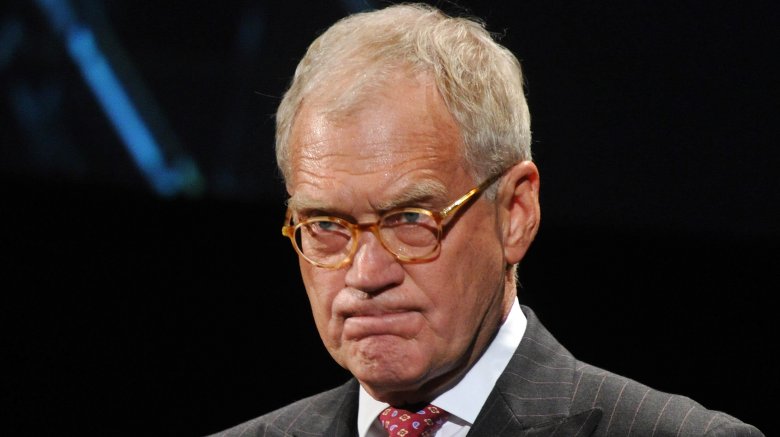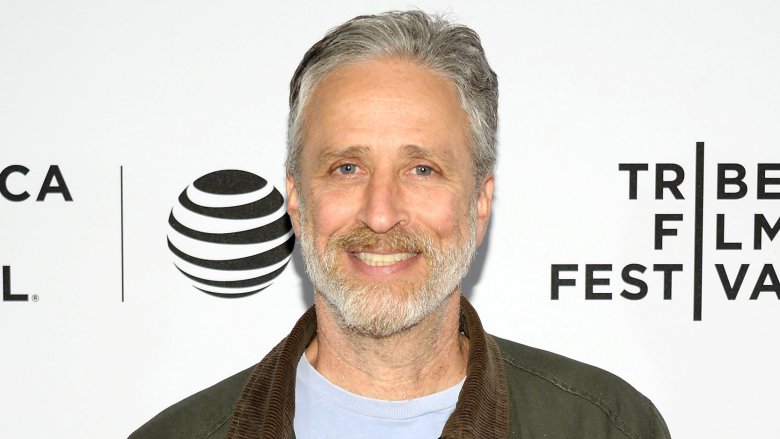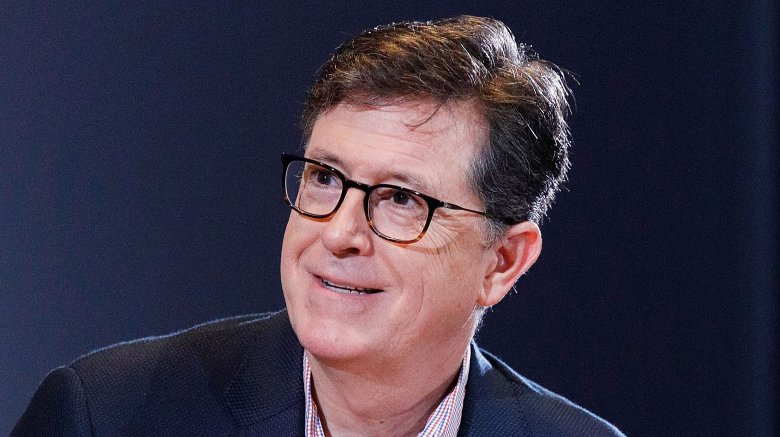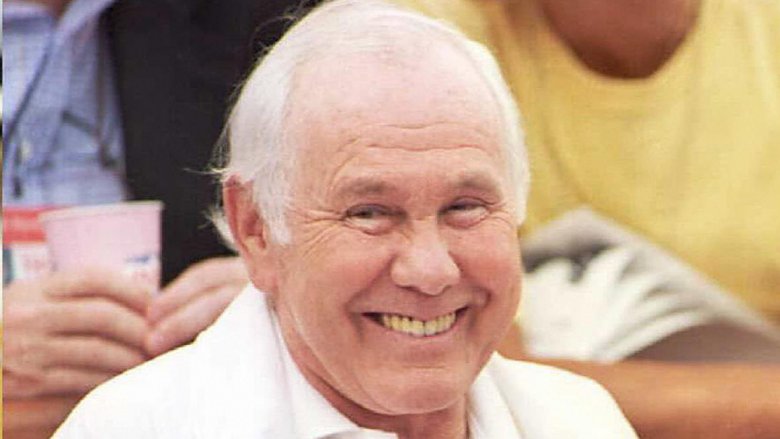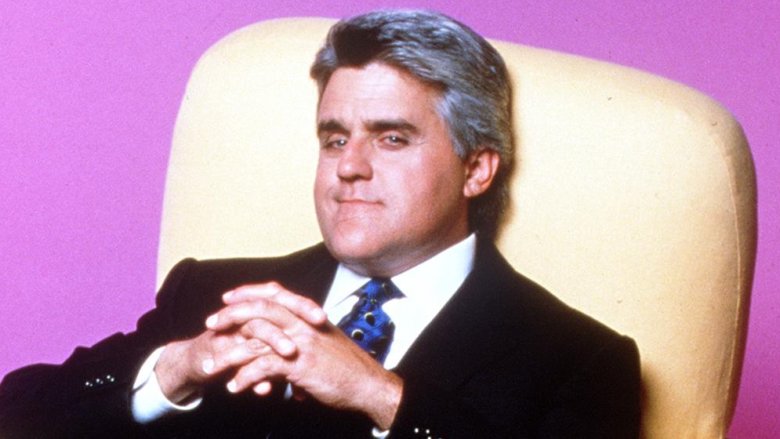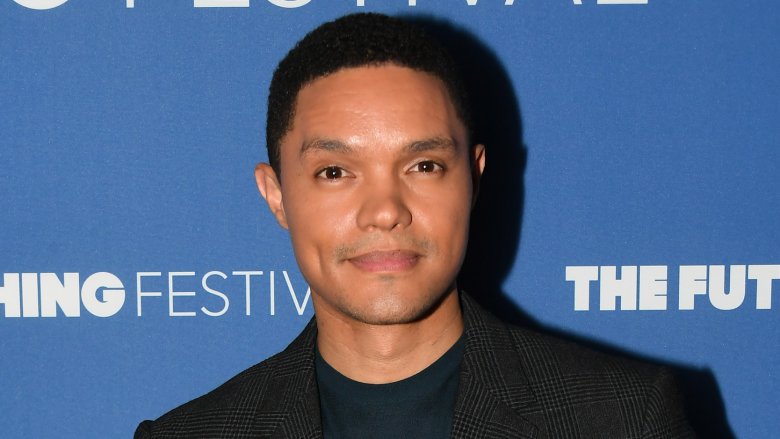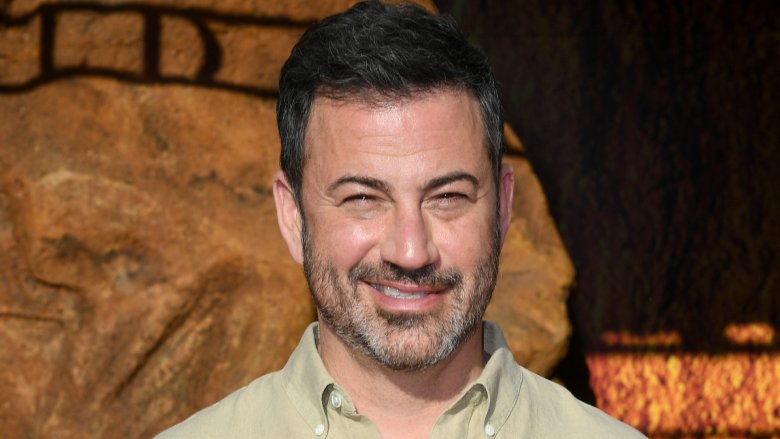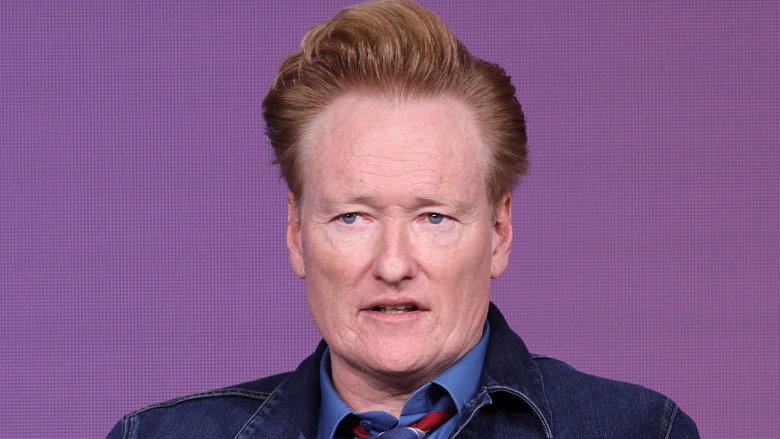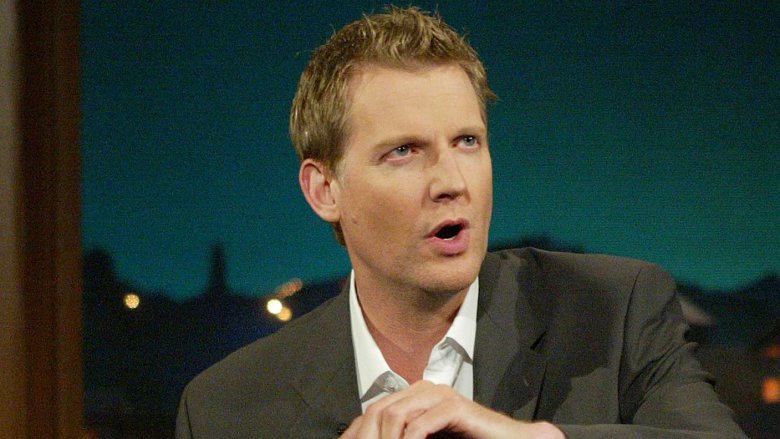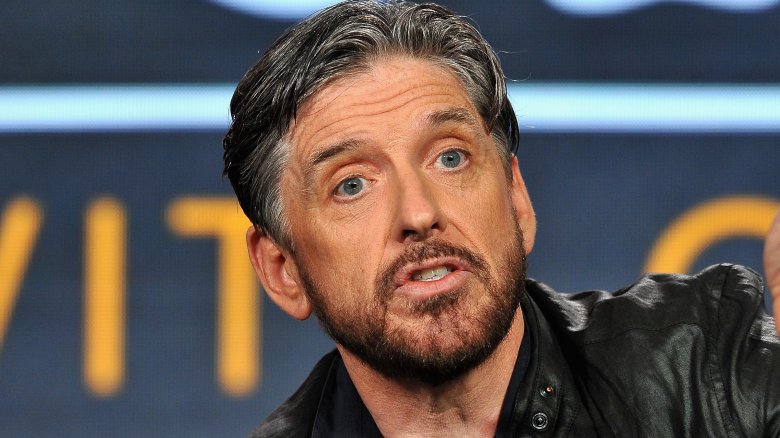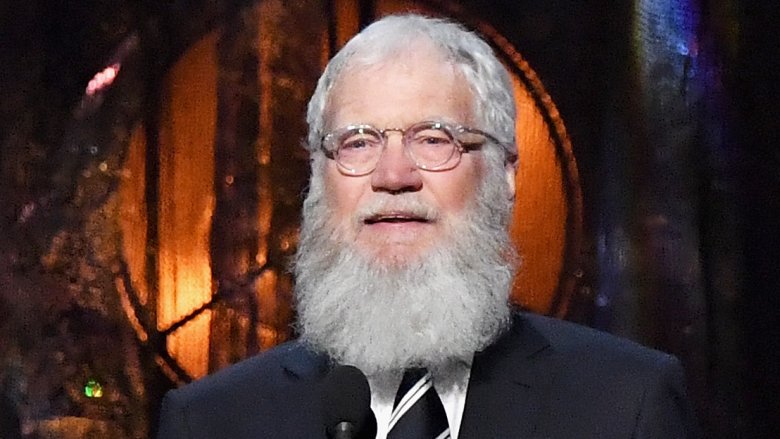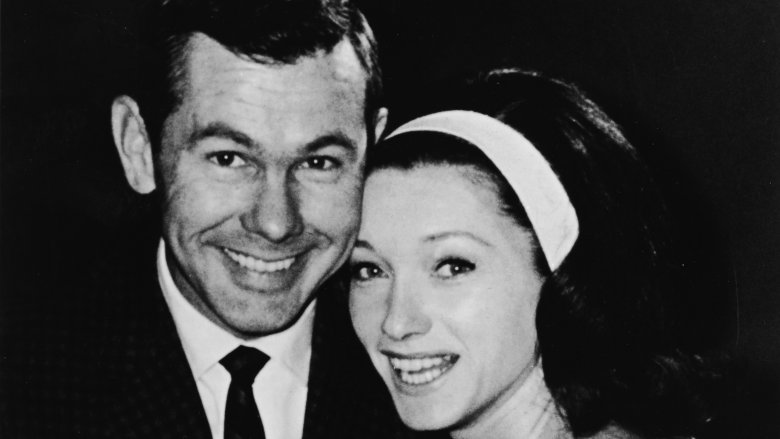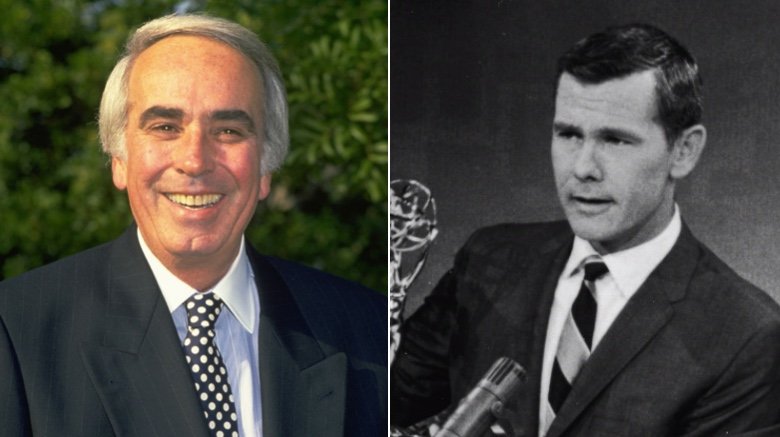Dark Secrets Of Late Night Talk Show Hosts
Late night is a very specific and rarified perch of TV. While a network may offer dozens of shows in its primetime lineup, only one person (almost always a man) gets to host its late-night show for five nights a week. It's a job a lucky entertainer will hold onto for years, virtually tucking in millions each night with their topical monologue jokes, softball celebrity interviews, and maybe a party game or a comedy sketch.
Ironically, producing such lighthearted fare is a grind, and it puts a lot of pressure on a host; a lot of money, a network's reputation, and dozens of jobs rely on that performer's ability to put on a show. Once in a while, they crack under the strain of the job. It doesn't justify their behavior, but being a late night host probably makes a person more liable to get themselves into trouble, or make them an unwitting target for the negative actions of others. Here are some of the darkest and most scandalous moments in the off-screen lives of TV's greatest late night talk show hosts.
Why it wasn't The Daily Show with Jon Leibowitz
Every night during his 16-year run as host of The Daily Show, which under his guidance provided scathing oversight of the media and government, Jon Stewart spoke truth to power. Perhaps he got a dry run for that dynamic with the simple act of changing his name.
Stewart's father, according to The Observer (via The Guardian), is a physics professor named Donald Leibowitz, and he left the family when the future comedian was 9 years old. That, and the divorce that followed, left Stewart with what he told The Guardian was a "complicated" relationship with his father. How complicated was it? When he entered show business, he dropped his father's last name completely — Jonathan Stuart Leibowitz became Jon Stewart.
He nearly made an even more pointed gesture. "There was a thought of using my mother's maiden name," he said, "but I thought that would be just too big a f*** you to my dad." Stewart has to be open with that story because he's received criticism from people who think he dropped the Leibowitz to conceal his Jewish heritage. "I hate myself for a lot of reasons," Stewart said, "but not because I'm Jewish."
Stephen Colbert's family tragedy
Losing a family member to a random tragedy is among the worst things that can happen to a person. It's nearly impossible to imagine what it's like to lose multiple loved ones, all at once, to the same horrible fate. Sadly, this all happened to Stephen Colbert in 1974.
According to GQ, Colbert, 10 at the time, was the youngest in a family of 11 kids living in Charleston, South Carolina. In 1974, Colbert's father, James, and his two directly older brothers Peter, 15, and James, 18, were onboard Eastern Airlines Flight 212 when pilot error caused it to crash in a cornfield in North Carolina, killing all three. All the other kids were older and had moved out of the family home by then, reducing the household to just Colbert and his mother. This horrible event led Colbert to act out, and he says he "barely graduated from high school." As he got older, he learned to cope with the tragedy, and even how to use it in his burgeoning comedy career. He figured out a way to be fueled by the fear and come to terms with it all. "Acceptance is not defeat," he said. "Acceptance is just awareness."
Johnny Carson loves Dave Letterman
NBC badly botched the handoff of The Tonight Show from longtime host Johnny Carson to new guy Jay Leno. David Letterman, whose Late Night had followed Carson's show for more than a decade, was the Tonight heir apparent, only for NBC to give the job to Jay Leno instead when Carson retired. That prompted Letterman to leave NBC for CBS to launch The Late Show to air opposite Leno. Letterman idolized Carson, but the feelings were virtually mutual — Dave was Johnny's personal preference to succeed him as host of The Tonight Show.
After his retirement in 1992, Carson never once returned to The Tonight Show, but in May 1994, he appeared in a brief cameo on The Late Show with David Letterman. That would mark Carson's last TV appearance ever before his death in 2005, but he apparently continued to quietly work in late night. Just before Carson passed away, Tonight Show and Late Show executive producer Peter Lassally revealed at a CBS press conference that Carson really missed his nightly Tonight Show monologue. "When he reads the paper every morning, he can think of five jokes off the bat that he wishes he had an outlet for," Lassally explained. But he did have an outlet, it turns out: Lassally said that Carson sometimes sent those jokes directly to Letterman, who would occasionally slip them into his nightly monologues. "Johnny gets a big kick out of that," Lassally added.
Everybody hates Jay Leno
After the post-Johnny Carson "late night" wars settled, with Jay Leno hosting The Tonight Show and David Letterman starting up a competing program at CBS, Leno wound up looking like the bad guy — a safe, mainstream comedian loved by network brass who took part in the corporate machinations to get his dream job and throw Letterman, once a friend, right under the bus.
Other major players in late night openly savaged Leno. "I always hear that Jay and I are friends when they interview him. Jay and I are not friends," competing host Arsenio Hall told Entertainment Weekly. Then he called out Leno's smug sense of privilege before threatening to "kick Jay's a**" (metaphorically speaking).
The Dennis Miller Show host Dennis Miller told EW that he thought Leno and his team were aggressive careerists and that "Jay and I were very good friends at one point" but that "I don't think I'd talk to him again, nor would he want to talk to me."
Even Carson's former Tonight Show bandleader Doc Severinsen got in on the Leno-bashing, too, telling USA Today (via Entertainment Weekly) that Leno was "trying to figure out, 'How can I get them to like me?' Frankly I haven't seen anything that makes me want to stay tuned in." Ouch.
Trevor Noah doesn't tweet so good
When Jon Stewart surprisingly announced his intention to vacate the anchor chair on The Daily Show in 2015, the media and fans wildly speculated about his successor. One problem: Seemingly no high-profile comedian wanted the job. Amy Poehler, Amy Schumer, and Chris Rock all turned down The Daily Show, which ultimately hired from within, giving Trevor Noah, a South African comedian and correspondent who'd only joined the show a few months earlier, the plum position.
While some wondered "who is this guy?" others vetted with a scouring of his social media history, and they uncovered a bunch of old and problematic tweets. Some of those tweets were jokes (often crude ones) made at the expense of broad groups of people, including Israelis, women, and overweight people. After calls for Comedy Central to rescind the job offer, Noah issued an apology, or rather an explanation, by way of Twitter: "To reduce my views to a handful of jokes that didn't land is not a true reflection of my character, nor my evolution as a comedian."
Jimmy Kimmel's first marriage didn't work out
After one year at UNLV, close to his childhood home in Las Vegas, Jimmy Kimmel headed to Arizona State University, where he got his first job in radio and also met Gina Maddy. In short order she became his girlfriend, and then his wife. When they wed, Kimmel was only 20. "My mom was 19 when she got married, so it didn't seem unusual to me," Kimmel told HuffPost. "It seemed unusual to all my friends, but not to me."
Within just a few years, he had two kids and struggled to maintain a stable family life, bouncing around radio stations in different cities. Things seemed to look up when he landed a job at influential Los Angeles radio station KROQ, and soon after broke into TV — he got a job hosting Comedy Central's game show Win Ben Stein's Money. Kimmel says his per-episode pay of $550 was too little to allow himself to quit his radio gig, so he worked punishing days that stretched from dawn into nighttime. Never being home put a lot of pressure on Kimmel's family life, and when he added another gig to the mix, Comedy Central's The Man Show, things started to crumble. Kimmel and Maddy separated in 2002 and were officially divorced by 2003, the same year Kimmel moved over to ABC's Jimmy Kimmel Live.
Conan O'Brien was stalked by a priest
For someone who's been part of the showbiz machine for more than 25 years, hosting late nights on NBC and TBS, Conan O'Brien's life has been refreshingly scandal-free. Only two major events mar Coco's tenure: that time in 2010 when NBC fired him from The Tonight Show after less than a year on the job and re-installed Jay Leno, and that time a priest stalked him.
Father David Ajemian, who claims to have attended Harvard at the same time as O'Brien, reportedly sent threatening letters to O'Brien's home and workplace (from his Boston parish's letterhead) for more than a year. In one letter, he seemed to be unreasonably angry about not being able to get tickets to a taping of Late Night with Conan O'Brien: "I'm told by some of those officious little usher people that you're overbooked. Is this the way you treat your most dangerous fans? You owe me big-time, pal. I want a public confession before I even consider giving you absolution." Yep — Ajemian threatened to get between O'Brien and God. In another letter, he alluded to O'Brien having to some day "dodge a bullet." Police arrested Ajemian and charged him with stalking and harassment, and the Roman Catholic Archdiocese of Boston placed the priest on leave.
Talk show host Craig Kilborn hated being a talk show host
Craig Kilborn enjoyed a meteoric rise to the top of the talk show heap in the 1990s. The original host of The Daily Show upon its debut in 1996 as a parody of lightweight news magazines, his sarcastic, mildly patronizing edge got him noticed by CBS, who installed him as host of the post-Letterman The Late Late Show in 1999. Kilborn ran a loose, silly show, but he walked away from the gig in 2004 after just five years.
Apart from a handful of small roles, he virtually disappeared from showbiz, and a talk show comeback in 2010 called The Kilborn File lasted only a few weeks. Just what happened to Kilborn, and why? " I didn't leave to do anything else, I left to leave," he told the Los Angeles Times, and suggested that he knew well before 2004 that he didn't want to host a late night talk show anymore. "I thought late night was crowded, the formats repetitive," he added. "I achieved my goals, and it wasn't all it was cracked up to be." A Late Late Show producer agreed, telling the Times that in his position at CBS, Kilborn "was totally bored."
Craig Ferguson nearly committed suicide
Scottish comedian Craig Ferguson succeeded Craig Kilborn as the host of CBS's The Late Late Show in 2005, and he arrived at the job via a long, circuitous path through entertainment very different than the one usually followed by a talk show host.
He'd was best known to American audiences as daffy boss Mr. Wick on The Drew Carey Show. Before that, he was a character comedian, performing as a folk singer named Bing Hitler, inspired to give comedy a shot at the urging of Peter Capaldi, the future star of Doctor Who and Ferguson's cohort in an early '80s punk band. As he found his way in the world, Ferguson almost lost his way, struggling mightily with alcoholism. "I have an addictive personality," he wrote in his book American on Purpose (via the New York Times). "I'll try anything a hundred times just to make sure I don't like it." Life got so bad for Ferguson that he decided to commit suicide... on Christmas Day 1991. He was on his way to the Tower Bridge in London, with the idea to jump off of it, but on the way he ran into a friend, who took him out for a drink instead. That distracted Ferguson from his tragic mission at hand, and before long, he entered a rehabilitation program.
The David Letterman extortion plot
Stephanie Birkitt joined the office staff of The Late Show with David Letterman in 1996 and also appeared in hundreds of bits. Birkitt and Letterman struck up a relationship in early 2006... while she was living with CBS News Producer Robert Halderman and he was with his longtime partner Regina Lasko. Halderman learned of the affair in late 2008 when he found Birkitt's diary, which detailed the many torrid nights she'd spent with Letterman. Birkitt promised Halderman she'd end the affair, and a few months later Letterman and Lasko married. But then in the summer of 2009, Halderman spotted the lovers canoodling again.
Halderman did what, well, not a lot of people would do. He wrote a treatment for a screenplay about Letterman and his purported sexual relationships with Late Show staffers. Then Halderman snuck it into Letterman's car and told him that for $2 million, he'd keep his mouth shut; if not, well, there would be consequences. That's extortion, actually, and Letterman called authorities. After Halderman tried to cash a fake $2 million check from Letterman, he was arrested.
On October 1, 2009, Letterman came clean on The Late Show. Saying he's done "terrible, terrible things," Letterman admitted that he "had sex with women who work for me on this show." Four days later, the New York Post revealed Birkitt's identity, and a few months later, Halderman received a six month prison sentence. Letterman and Lasko are still married.
Here's Johnny... breaking into his wife's apartment
A little thing like marriage didn't stop Johnny Carson from dating. In his book Johnny Carson, the host's lawyer and close friend Henry Bushkin (via the New York Post) details several Carson sexcapades, including an affair with a Playboy model, a Las Vegas rooftop naked pool party, and the time one of his wives (Carson married four times) "discovered a film of Johnny en flagrante with a comely young lady."
But while Carson stepped out, he apparently didn't think his wives could. Bushkin notes that Carson had proof his second wife, Joanne, had quietly rented out an apartment in New York City which he believed she used as a love nest. Bushkin offered to file divorce papers, but Carson had a better idea: He wanted Bushkin to accompany him and security expert Arthur Kassel to break into that apartment, Watergate style, and find evidence of the tryst. This trio of adult men successfully busted into the apartment and found what they were looking for. Along with some men's clothes and sexy lingerie, they noticed "about six or seven framed photographs of Joanne's playmate." That pictured playmate: NFL star (and future husband to Kathie Lee) Frank Gifford. Bushkin says that when Carson realized his wife really was two-timing him, he "leaned against the living room wall and began to weep."
Here's Johnny... going after Tom Snyder
From 1973 to 1982, Tom Snyder hosted the post-Tonight Show show The Tomorrow Show, and from 1995 to 1999, the similar CBS talker The Late Late Show. Both programs featured Snyder engaged in serious one-on-one chats with newsmakers and high-brow cultural figures, and then veering off on long, rambling self-indulgent tangents. Snyder's broadcasts were a brainy, sedate alternative to the usually comedic late-night shows, or, in other words, he wasn't for everyone.
One guy in particular couldn't stand him: Johnny Carson. According to Johnny Carson by Henry Bushkin, Carson "thought Snyder had no talent and was an officious bore." One night in 1979, Carson took his inner circle out to dinner at Hollywood hotspot Chasen's, and spotted Snyder eating by himself. Did the Carson collective invite their late-night mate over to their table? They did not, because they all knew Carson hated the guy. Instead, Carson sat at his table, downed multiple glasses of wine, and glowered at Snyder. He finally blurted out, 'Why the f*** is he staring at me? I'm going to go over there and kick the s*** out of that guy." And so Carson went over there, and while Snyder tried to buy him a drink, the king of late night instead "lunged across the table and grabbed for Snyder's throat." He couldn't quite reach, and Johnny's loyal on-screen sidekick Ed McMahon broke it up.

